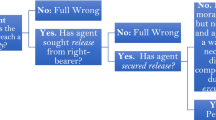Abstract
The paper proposes a revised logic of rights in order to accommodate moral conflict. There are often said to be two rival philosophical accounts of rights with respect to moral conflict. Specificationists about rights insist that rights cannot conflict, since they reflect overall deontic conclusions. Generalists instead argue that rights reflect pro tanto constraints on behaviour. After offering an overview of the debate between generalists and specificationists with respect to rights, I outline the challenge of developing a logic of rights-reasoning that is compatible with generalism. I then proceed to offer a new logical framework, which utilizes a simple non-monotonic logic of practical reasoning. Both generalist and specificationist interpretations of the logic are explored. The revised logic shows that traditional characterizations of the debate between specificationists and generalists obscure other relevant philosophical positions.
Similar content being viewed by others
Notes
A full formalization of Hohfeld’s logic would require a proper treatment of individual agency, as in the Kanger-Lindahl theory of normative positions (see Sergot 2013 for an overview). I omit the logic of agency here in order to simplify the presentation.
I am making the simplifying assumption that a privilege only exists where there no opposing pro tanto duty. This characterisation rules out the possibility that pro tanto Hohfeldian claims might conflict with pro tanto Hohfeldian privileges (cf. Sinnott-Armstrong 1996, p. 61).
Wellman says at one point that the moral reasons for breaking into the cabin outweigh the reasons for not doing so (1995, pp. 288–290). However in her initial discussion of Feinberg’s example Thomson (1986, pp. 66–77) restricts herself to the claim that breaking into the cabin and burning the chairs is permissible (cf. Thomson’s discussion of the analogous problem in Vincent v Lake Erie Transportation Co (1990, pp. 101–103). The stronger claim seems more plausible to me, but I have presented both interpretations.
References
Botterell, A. (2008). In defence of infringement. Law and Philosophy,27(3), 269–292.
Brink, D. (1994). Moral conflict and its structure. Philosophical Review,103(2), 215–247.
Dancy, J. (1993). Moral reasons. Oxford: Blackwell.
Feinberg, J. (1978). Voluntary euthanasia and the inalienable right to life. Philosophy & Public Affairs,7(2), 93–123.
Finnis, J. (1971). Some professorial fallacies about rights. Adelaide Law Review,4, 377–389.
Foot, P. (1983). Moral realism and moral dilemmas. Journal of Philosophy,80(7), 379–398.
Goble, L. (2013). Prima facie norms, normative conflicts, and dilemmas. In D. Gabbay, X. Parent, R. van der Mayden, & L. van der Torre (Eds.), Handbook of deontic logic and normative systems (pp. 241–352). Milton Keynes: College Publications.
Hohfeld, W. N. (1919). Some fundamental legal conceptions as applied in judicial reasoning and other legal essays. New Haven: Yale University Press.
Horty, J. (2012). Reasons as defaults. Oxford: Oxford University Press.
Liberto, H. (2014). The moral specification of rights: A restricted account. Law and Philosophy,33(2), 175–206.
Marcus, R. B. (1980). Moral dilemmas and consistency. Journal of Philosophy,77(3), 121–136.
Montague, P. (1984). Rights and duties of compensation. Philosophy & Public Affairs,13(1), 79–88.
Montague, P. (2015). Specification and moral rights. Law and Philosophy,34, 241–256.
Nair, S. (2014). Consequences of reasoning with conflicting obligations. Mind,123(491), 753–790.
Nair, S. (2016a). Conflicting reasons, unconflicting ‘oughts’. Philosophical Studies,173(3), 629–663.
Nair, S. (2016b). How do reasons accrue? In E. Lord & B. Maguire (Eds.), Weighing reasons (pp. 56–73). Oxford: Oxford University Press.
Oberdiek, J. (2004). Lost in moral space: On the infringing/violating distinction and its place in the theory of rights. Law and Philosophy,23(4), 325–346.
Oberdiek, J. (2008). Specifying rights out of necessity. Oxford Journal of Legal Studies,28(1), 127–146.
Parent, W. A. (1980). Judith Thomson and the logic of rights. Philosophical Studies,37(4), 405–418.
Parent, W., & Prior, W. (1996). Thomson on the moral specification of rights. Philosophy and Phenomenological Research,56(4), 837–845.
Pietroski, P. (1993). Prima facie obligations, ceteris paribus laws in moral theory. Ethics,103(3), 489–515.
Raz, J. (1988). The morality of freedom. Oxford: Oxford University Press.
Reiter, R. (1980). A logic for default reasoning. Artificial Intelligence,13, 81–137.
Richardson, H. (1990). Specifying norms as a way to resolve concrete ethical problems. Philosophy & Public Affairs,19(4), 279–310.
Sayre-McCord, G. (1986). Deontic logic and the priority of moral theory. Noûs,20(2), 179–197.
Searle, J. (1978). Prima Facie Obligations. In J. Raz (Ed.), Practical Reasoning (pp. 81–90). Oxford: Oxford University Press.
Sergot, M. (2013). Normative positions. In D. Gabbay, X. Parent, R. van der Mayden, & L. van der Torre (Eds.), Handbook of deontic logic and normative systems (pp. 353–406). Milton Keynes: College Publications.
Shafer-Landau, R. (1995). Specifying absolute rights. Arizona Law Review,37, 209–225.
Sinnott-Armstrong, W. (1996). Moral dilemmas and rights. In H. E. Mason (Ed.), Moral dilemmas and moral theory (pp. 48–65). Oxford: Oxford University Press.
Steiner, H. (1977). The structure of a set of compossible rights. Journal of Philosophy,74(12), 767–775.
Thomson, J. J. (1986). Rights, restitution, and risk: Essays, in moral theory. Cambridge, MA: Harvard University Press.
Thomson, J. J. (1990). The realm of rights. Cambridge, MA: Harvard University Press.
von Wright, G. H. (1968). An essay in deontic logic and the general theory of action. Amsterdam: North Holland Publishing Company.
Wellman, C. H. (1995). On conflicts between rights. Law and Philosophy,14(3/4), 271–295.
Williams, B. (1965). Ethical consistency. Aristotelian Society Supplementary Volume,39, 103–124.
Acknowledgements
The ideas developed in this paper emerged from earlier papers presented at the University of Bayreuth on two occasions. The first occasion was the 13th International Conference on Deontic Logic and Normative Systems in 2016. The second occasion was the 3rd Meeting of the Permissions, Information and Institutional Dynamics, Obligations and Rights Project Group in 2017. I am grateful to reviewers and audience members for their thoughtful discussion of these earlier papers. I am especially grateful for conversations with Olivier Roy and Huimin Dong. Finally, I would like to thank an anonymous referee for this journal, whose comments have greatly improved this article.
Author information
Authors and Affiliations
Corresponding author
Rights and permissions
About this article
Cite this article
Mullins, R. Moral conflict and the logic of rights. Philos Stud 177, 633–651 (2020). https://doi.org/10.1007/s11098-018-1197-1
Published:
Issue Date:
DOI: https://doi.org/10.1007/s11098-018-1197-1



